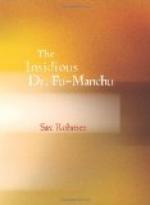From my brief history of the wonderful and evil man who once walked, by the way unsuspected, in the midst of the people of England— near whom you, personally, may at some time unwittingly, have been— I am aware that much must be omitted. I have no space for lengthy examinations of the many points but ill illuminated with which it is dotted. This incident at the docks is but one such point.
Another is the singular vision which appeared to me whilst I lay in the cellar of the house near Windsor. It has since struck me that it possessed peculiarities akin to those of a hashish hallucination. Can it be that we were drugged on that occasion with Indian hemp? Cannabis indica is a treacherous narcotic, as every medical man knows full well; but Fu-Manchu’s knowledge of the drug was far in advance of our slow science. West’s experience proved so much.
I may have neglected opportunities—later, you shall judge if I did so— opportunities to glean for the West some of the strange knowledge of the secret East. Perhaps, at a future time, I may rectify my errors. Perhaps that wisdom—the wisdom stored up by Fu-Manchu—is lost forever. There is, however, at least a bare possibility of its survival, in part; and I do not wholly despair of one day publishing a scientific sequel to this record of our dealings with the Chinese doctor.
CHAPTER XXI
Time wore on and seemingly brought us no nearer, or very little nearer, to our goal. So carefully had my friend Nayland Smith excluded the matter from the press that, whilst public interest was much engaged with some of the events in the skein of mystery which he had come from Burma to unravel, outside the Secret Service and the special department of Scotland Yard few people recognized that the several murders, robberies and disappearances formed each a link in a chain; fewer still were aware that a baneful presence was in our midst, that a past master of the evil arts lay concealed somewhere in the metropolis; searched for by the keenest wits which the authorities could direct to the task, but eluding all—triumphant, contemptuous.
One link in that chain Smith himself for long failed to recognize. Yet it was a big and important link.
“Petrie,” he said to me one morning, “listen to this:
“`. . .In sight of Shanghai—a clear, dark night. On board the deck of a junk passing close to seaward of the Andaman a blue flare started up. A minute later there was a cry of “Man overboard!”
“`Mr. Lewin, the chief officer, who was in charge, stopped the engines. A boat was put out. But no one was recovered. There are sharks in these waters. A fairly heavy sea was running.
“`Inquiry showed the missing man to be a James Edwards, second class, booked to Shanghai. I think the name was assumed. The man was some sort of Oriental, and we had had him under close observation. . . .’”




